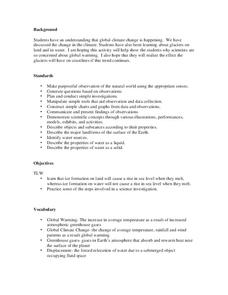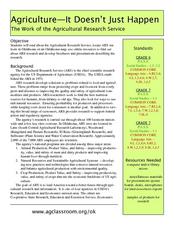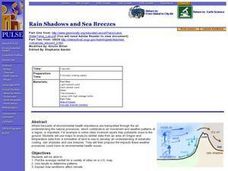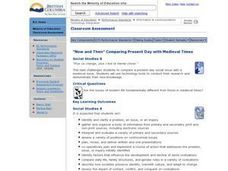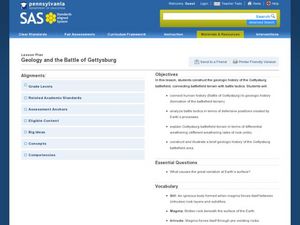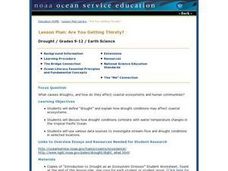Curated OER
Global Climate Change
Second graders investigate the effect of melting glaciers to sea level. In this earth science lesson, 2nd graders simulate the process in the lab by conducting an experiment using ice cubes and clay. They explain the consequences of...
Curated OER
Examining Spectra
High schoolers examine the spectra with the use of light while constructing their own spectroscope. They make observations about the colors and visible wavelengths of light and then conduct classroom discussions. As an extension students...
Curated OER
Erosion
Students discover the meaning of the word erosion and discuss effects of rocks and sticks upon the soil. They then work in small groups to construct a model of erosion to make observations and then write them in their science journals.
Curated OER
Agriculture - It Doesn't Just Happen
Sixth graders examine the role of the US Department of Agriculture. In this United States Agriculture lesson, 6th graders create maps with sites and specialty areas. Students create a presentation on the topic they were given to research.
Curated OER
Fun With Fish Forms
Students explore fish adaptations and anatomy. In this science lesson plan, students discuss various adaptations of fish and how those adaptations help them.
Curated OER
Rain Shadows and Sea Breezes
Students plot the average rainfall for a variety of cities in the United States. Using the map, they work together to determine patterns on which toxicants are transported through the air. They determine the impacts of various weather...
Curated OER
"Now and Then" Comparing Present Day with Medieval Times
Eighth graders compare a present-day social issue with a medieval issue. They use technology tools to conduct their research and demonstrate their new knowledge. Students present their findings to the class in the form of a PowerPoint.
Curated OER
Observing Brine Shrimp
Students observe brine shrimp eggs, create an appropriate environment for their survival, and observe their growth.
Curated OER
One of These Things is Not Like the Other
Students examine sets of four or five organisms and determine which organism in each set doesn't "belong", and determine a variety of characteristics that explain why it doesn't belong.
Curated OER
Species at Risk: Recovery Teams to the Rescue!
Sixth graders discuss how certain species and plants are deemed endangered. They work together in conservation recovery teams to research an endangered species. Then they explore efforts to make sure that the existence of these species...
Curated OER
State of Matter - Atoms
Learners examine and discuss how atoms change from solid to liquid to gas. They inflate a balloon by melting ice that converts to steam, and discuss the results.
Curated OER
Lesson 9 - Along Our Coast
Learners study the benefits of estuaries. They construct a saltwater food web, and complete worksheets and a quiz.
Curated OER
Wright Brothers Centennial: North Carolina, Geography and History
Fourth graders identify symbols, people and events associated with North Carolina history. Using this information, they focus on the Wright brothers and their first flight. They answer questions related to the event and discuss how...
Curated OER
Language Arts: Using Research Tools Successfully
High schoolers are able to record their research observations and reflections by keeping a research journal. They are able to explore a specific region of the world affected by arsenic contamination by using various research skills and...
Curated OER
Growing Tomatoes from Seed
In this growing tomatoes worksheet, learners experience and participate in the process of growing tomatoes over a three or four month span of time. Students follow six directives in producing tomato plants.
Curated OER
Growing Tomatoes From Seed Activity
In this growing tomatoes worksheet, students plant tomato seeds in February, and follow their growth through the summer break. They observe and investigate the plant growth from seed to plant.
Curated OER
Digging Up The Facts
Young scholars research environmental issues. In this environmental lesson, students use the Internet to research an environmental problem and list ten facts about it. Young scholars write a summary of facts.
Curated OER
Horticulture Crops in the agro-ecosystem
Ninth graders apply ecological analysis to fruit and vegetable production systems. In this horticulture lesson students learn about different management practices.
Curated OER
What Makes you Hot?
Learners manipulate different variables in a model and make inferences about the temperature on Earth. In this heat lesson students calculate the blackbody radiation of an object at a certain temperature.
Curated OER
End of the Line: What Happened to the Blue Ridge Railroad?
Sixth graders study the westward expansion and the role of railroad construction to the expansion. In this railroad history lesson, 6th graders complete KWL activity for the topic. Students view a PowerPoint about the growth of railroads...
Curated OER
Geology and the Battle of Gettysburg
Young scholars create geologic maps of the Gettysburg battlefield. In this geologic skills lesson, students consider the variations of Earth's surfaces and explore strategies employed by the North and South in the Battle of Gettysburg to...
Curated OER
The Rifting of Pangaea and the Gettysburg Battlefield
Eleventh graders analyze and interpret an animated model of Earth’s rifting processes. For this Earth Science lesson, 11th graders connect Earth’s rifting processes with the Earth’s surface in the Gettysburg battlefield. Students apply...
Curated OER
Are You Getting Thirsty?
Students study droughts and how they affect communities and coastal ecosystems. In this ecosystems lesson plan students use data to examine drought conditions in certain areas.
Curated OER
Time and Cycles - Dendrochronology
Students investigate the lives of trees by examining ring cycles. In this plant life lesson, students identify the field of study known as dendrochronology and discover its history. Students investigate a simulated tree ring and...


